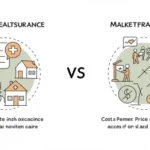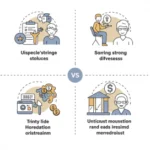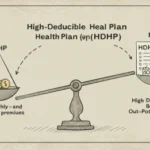Choosing a health insurance plan can feel overwhelming, especially when faced with confusing acronyms like PPO and HMO. While both are common types of managed care plans in the U.S., they come with important differences that can significantly affect your healthcare access, costs, and flexibility.
If you’re enrolling in a new plan for 2025 or simply want to better understand your options, this guide will break down the key differences between PPO and HMO plans — helping you choose what’s best for your needs and budget.

What Is an HMO Plan?
HMO stands for Health Maintenance Organization. It’s a type of health insurance plan that requires you to use a network of doctors and hospitals that contract with the HMO.
Key Features:
- Primary Care Physician (PCP) Required: You must choose a PCP who manages your care.
- Referrals Needed: To see a specialist, you need a referral from your PCP.
- In-Network Only: HMO plans typically do not cover out-of-network services (except in emergencies).
- Lower Monthly Premiums: HMOs usually offer more affordable premiums and lower out-of-pocket costs.
Pros:
- Lower monthly premiums
- Coordinated care through a single physician
- Focused on preventive health services
Cons:
- Limited flexibility
- Requires referrals
- No coverage outside the network
Best For:
- People who want low-cost coverage and don’t mind staying within a limited network
What Is a PPO Plan?
PPO stands for Preferred Provider Organization. This type of plan offers more flexibility when choosing doctors and specialists.
Key Features:
- No PCP Required: You don’t need to choose a primary doctor or get referrals.
- Out-of-Network Coverage: You can see any provider, but costs are lower if you stay in-network.
- Higher Monthly Premiums: PPOs typically have higher premiums and deductibles.
Pros:
- Freedom to see any healthcare provider
- No referrals required
- Coverage for out-of-network services
Cons:
- Higher premiums and deductibles
- More complex billing (especially out-of-network)
Best For:
- People who value flexibility and access to a wide range of providers
Side-by-Side Comparison Table
| Feature | HMO | PPO |
|---|---|---|
| Primary Care Physician | Required | Not required |
| Specialist Referrals | Required | Not required |
| Out-of-Network Coverage | Emergency only | Covered, but at a higher cost |
| Monthly Premiums | Lower | Higher |
| Deductibles | Lower | Often higher |
| Flexibility | Limited | High |
| Ideal For | Budget-conscious users | Those needing flexible care access |
How to Decide: Questions to Ask Yourself
Choosing between an HMO and a PPO depends on your health needs, budget, and how much control you want over your care.
Ask yourself:
- Do I want to choose my own specialists without a referral?
→ If yes, a PPO may suit you better. - Do I want to keep my healthcare costs as low as possible?
→ Consider an HMO for lower premiums and co-pays. - Do I travel frequently or live in multiple locations?
→ A PPO plan will provide more nationwide coverage. - Am I managing a chronic condition with a preferred doctor?
→ Make sure your provider is in-network under your plan.

Real-Life Examples
Example 1: Sarah, 28, is generally healthy, works remotely, and only visits a doctor once a year. She chooses an HMO plan to save on monthly premiums and doesn’t mind sticking to a small network.
Example 2: John, 52, sees a cardiologist and orthopedic specialist regularly. He chooses a PPO plan because his preferred doctors aren’t in-network for most HMOs.
Final Thoughts
There is no one-size-fits-all answer when it comes to choosing between an HMO and PPO plan. Your lifestyle, health needs, and financial goals will determine which type of plan makes the most sense.
Before enrolling, always compare plan details, including premium costs, deductible amounts, co-pays, and provider networks. Use trusted resources like Healthcare.gov to view available plans in your area, and don’t hesitate to speak with a licensed insurance broker for personalized help.
aking the right choice can save you money and ensure you get the care you need — when and where you need it.

Hi, I’m Hibiki — the writer behind HealthManual.net.
I cover health insurance news, wellness tips, and insightful analysis of pharmaceutical and healthcare stocks. My goal is to simplify complex topics and make health and finance information more accessible to everyone.
Thanks for reading — I hope you find the content helpful and reliable.















